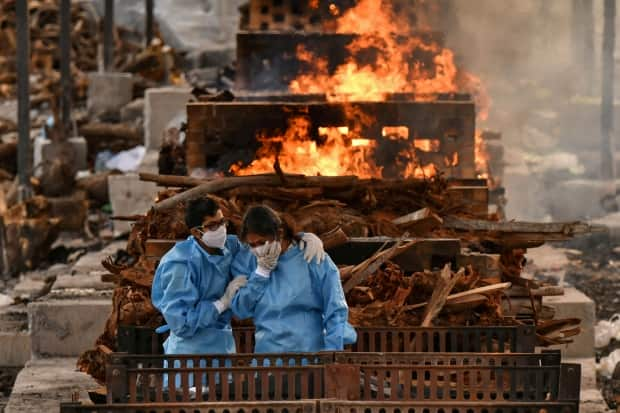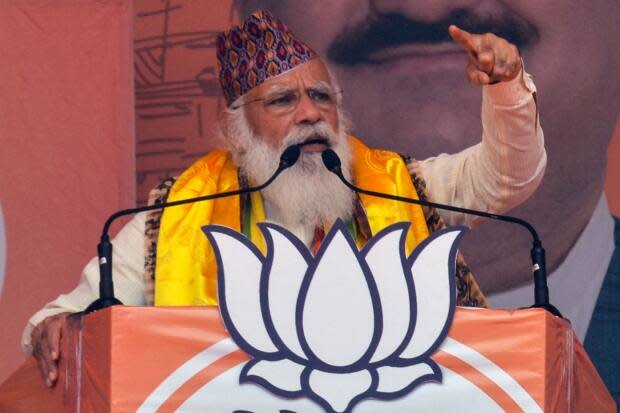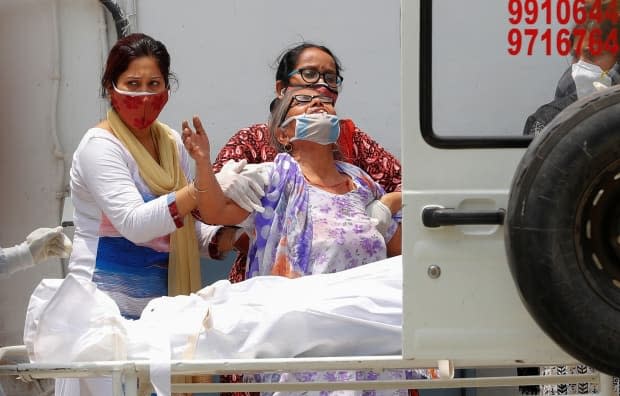Popularity crumbles for Indian PM Modi as devastating COVID-19 surge continues

For a leader who has skirted political challenges and enjoyed widespread popularity over years in office, the devastating COVID-19 crisis hitting India may prove the most challenging yet for Prime Minister Narendra Modi, analysts say.
A deep, seething anger is palpable in many parts of the country that are struggling to contain the effects of a brutal second wave, and much of that ire is being directed at the government for failing to adequately prepare for a resurgence of the virus.
Stories of Indians pleading on social media for oxygen supplies or antiviral drug treatments abound, as planes full of foreign aid keep touching down in an attempt to keep the country's struggling health-care system from collapsing.
Baljeet Asthana was so upset after spending days trying to secure an ICU bed for her mother, who she said was slowly dying because of a lack of oxygen, that she recorded a video of herself outside a New Delhi hospital in early May.
Asthana addressed herself directly to the prime minister, asking what she should do.
"I would request Modi-ji and Kejriwal to let me know," she says into her phone's camera, referring also to Delhi's chief minister, Arvind Kejriwal.
She's polite and restrained but has a disquieting request for help.
"If you cannot advise me, sir, then I would request you to legalize mercy killing in India. Because you have no idea what the common citizen of India is going through at the moment," she says, straight to the camera.
"We are struggling, we are struggling to get basic things like oxygen, medicines, hospitals," Asthana continues steadily. "Let us die with dignity."
Rural areas hit
That anger is also spreading to more rural areas as they heave under the pressure of daily infection rates.
India has posted more than 300,000 new infections every day for more than three weeks, and the country accounted for half of the cases reported globally last week, according to the World Health Organization. Experts believe the official record of cases and deaths is vastly underestimated.
In Uttar Pradesh, India's most populous state, which has been hit particularly hard by the devastating second wave, there's scorn for the government's response.
A man, his voice rising in anger outside a hospital in the city of Meerut after losing his niece to the virus, curses and rails against Modi's Bharatiya Janata Party for claiming to be a superpower.

"What kind of superpower can't even find oxygen for its people?" he asks, waving an oxygen mask in front of the camera documenting it for the investigative website Newslaundry.
"As people are suffering, most certainly some of that suffering is translating into an anger against the political leadership," said Yamini Aiyar, president of the New Delhi-based think-tank Centre for Policy Research.
'We fell into policy complacency'
Aiyar said it's well known that India spends far less than any other comparable economy on its health-care system — about one per cent of its GDP — and the country's health infrastructure is "creaking if not broken."
And yet the Indian government didn't spend time strengthening it to prepare for a possible second wave of an unpredictable virus.
"Rather we fell into the trap of assuming there was such a thing as Indian exceptionalism," Aiyar told CBC News. The first wave of the pandemic did not hit India as hard as public health experts had feared nor as hard as other countries.
"We fell into policy complacency."
Modi told a virtual summit of the World Economic Forum in January that India has beaten the virus and "saved humanity from a big disaster by containing corona effectively."
Three months later, India was posting the world's highest infection numbers.

Aiyar said many Indians feel that the warning signs of a second wave were ignored and that Modi — who spent much of March and early April campaigning in crucial state elections and holding rallies in front of thousands of people — has been missing in action as the nation goes through a health crisis.
"We're seeing a prime minister who is absent," Aiyar said.
She said that's especially striking for a politician who has built his brand on mobilizing his supporters directly through non-traditional means, such as social media platforms, instead of going through media outlets and holding news conferences. (Modi has not held a news conference in his seven years in office.)
"What we're seeing instead is a deep silence and I would go so far as to say a deep callousness on the part of our political leadership at a time of national crisis," Aiyar said.
"His silence is something that I think has exaggerated the sense of anger and of betrayal."
WATCH | Growing anger at Indian PM Modi as COVID-19 crisis continues:
'A war footing'
On Friday, Modi told a virtual conference to farmers that his government was "on a war footing" trying to contain the virus. He mentioned the virus was spreading fast in rural areas.
"All departments of the government, all resources, our armed forces, our scientists, everyone is working day and night to counter COVID together," he said.
It was the first time he referred to the second wave's effects on India's countryside, where health-care services are not robust.

Modi hasn't given a televised address to the country since April 20, when he ruled out a nationwide lockdown such as the one he imposed when the virus first spread in March 2020, preferring localized containment strategies.
He did call on Indians to take public health measures seriously and to show "discipline" to "win the battle against corona."
But that speech took place mere days after he held a massive political rally in West Bengal, where his party was trying to win the state election, and he marvelled at how many people he could see in the crowd in front of him while infections were rising in the country.
Modi was also criticized for not taking pains to discourage millions from descending on the holy city of Haridwar to take a dip in the Ganges River for the Kumbh Mela Hindu festival in March and April.
Although he later urged the festival to end early, by then thousands had been confirmed infected.

Consequences for a 'Teflon' leader?
While the anecdotal evidence suggests there is deep anger on the streets of India, particularly in urban areas, official polling is still scarce.
American data firm Morning Consult, which also tracks 12 other global leaders, released numbers that suggest Modi's popularity dipped sharply in April and is now at its lowest point in a year and a half.
"Modi is really in uncharted political territory," said Michael Kugelman, senior associate for South Asia at the Woodrow Wilson Center in Washington, D.C.
"He has never been criticized so heavily by so many people as much as he is now," Kugelman said, noting how unusual such a position is for the politician he deems "a Teflon man."
"Political challenges and political vulnerability, it doesn't stick to him. He manages to get over it."

And Modi still remains the most popular world leader tracked by the polling firm, one point higher than Mexico's Andres Manuel Lopez Obrador and 29 points higher than Canadian Prime Minister Justin Trudeau, as of May 11.
Modi's current approval rating sits at 63 per cent, according to Morning Consult, with a disapproval rating of 31 per cent.
That's a key sign that it's too early to tell if this current crisis will have a long-term effect on Modi.
"His numbers are still fairly high," said Sadanand Dhume, a research fellow with the Washington-based American Enterprise Institute. "Around 65 per cent is still a pretty good approval rating for a democratically elected leader."
But Dhume insisted that criticism over his handling of the COVID-19 crisis is much harder for Modi and his government to skirt because the pain is so personal, and the evidence that the country is struggling is overwhelming.
What matters, according to Dhume, is how long it takes for India to get a handle on its brutal second wave, as hospitals are still reporting shortages of crucial medical supplies and beds.
Modi's brand has also been dented, along with his preferred image of a strong India.
India has for more than a decade refused foreign aid, insisting that it is self-reliant, but that long-standing position from the aftermath of the 2004 tsunami has now been reversed.
The country is watching planes land filled with international coronavirus relief supplies that local officials struggle to distribute to where it's most needed, while people take to social media to scrounge up life-saving oxygen.

There may be short-term political consequences for Modi and his BJP party, but the next general election is still three years away.
Plenty of time for Modi and his advisers to focus on something else and for his popularity numbers to rebound, Dhume said.
"They will do what they've already begun to do, they're going to change the subject," Dhume said.
"They'll find something else to talk about, and they will hope that by the time the next general election rolls around, people will have forgotten the horrors of 2020 and 2021."

